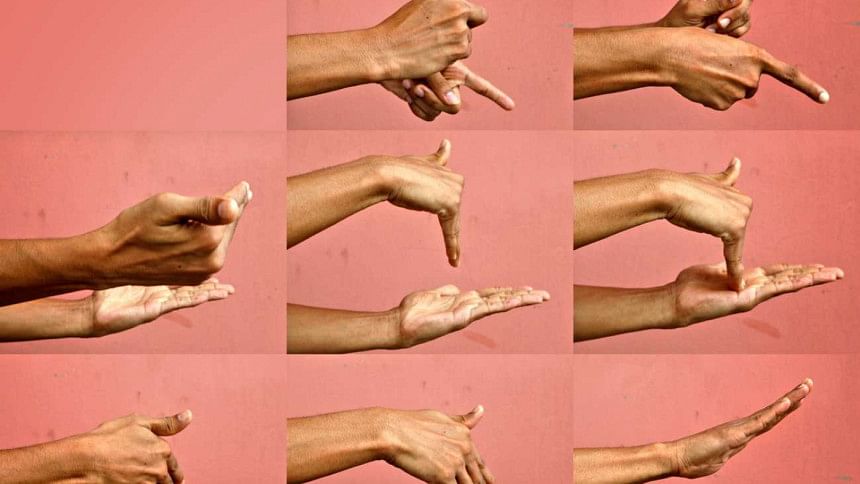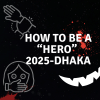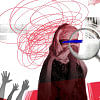What about justice for the unheard?

PHOTOS: KAZI TAHSIN AGAZ APURBO
14-year-old Lamiya* no longer steps outside her home alone. She stays inside, following her mother around on her chores every day or lying around listless. Last year, Lamiya was raped and impregnated by her 60-year-old neighbour. A slight girl, she was even thinner earlier, but has since put on weight as a result of the medication she was on during her pregnancy. She constantly looks for reassurance to her mother when she is having trouble understanding or forming words.
Lamiya is intellectually disabled. When Lamiya was born, her parents were concerned because her head was larger in proportion to the rest of her body. She took longer to speak and walk than her siblings. She learned to walk at four years and still cannot form phrases fully. Right beside Lamiya's house is a madrasa for girls. When she was seven, Lamiya's mother first took her to the madrasa. "She would learn the letters, aleph ba ta, but could not retain what she learned," says Lamiya's mother. She eventually stopped taking Lamiya there.
Her home is on the edge of a small village set in the lush green fields of Khulna, more than 16 km from city. The second child of a poor family, she grew up with her parents and siblings in a house consisting of one room with a tin roof and a straw-thatched separate kitchen. Her father is a day labourer, earning between BDT 250-300 a day.

The details of her rape come bursting forth from 14-year-old Lamiya's lips. On the afternoon of November 22, 2015, Lamiya's mother sent her to get some drinking water, from a tubewell down the street, for her father who had just arrived home. On her way back, 60-year-old farmer Abdul Barek Mollah, known to Lamiya as Dada, as he was a distant relative of her family, bound a gamcha over her eyes and took her to his empty house next door, where he raped her. "Dada held a da [cleaver] to my throat and threatened to take me from my mother and kill me if I told anyone what happened," shares Lamiya.
Lamiya walked home with the water kolshi and stayed silent. "I wanted to tell Ma but he started coming around to our house almost every day after [the rape]," says Lamiya. Her family had no clue that their neighbour and distant relative who had violated and threatened Lamiya was now inflicting his presence on her every day. Mollah would presumably stop by to chat and have paan with the others and keep an eye on Lamiya to see if she had revealed what he had done to her. Lamiya would quietly go into the inner room to avoid him. "I felt afraid every time he came to the house," she admits.
Lamiya had just started getting her period around the time of her rape. So, her mother became concerned when she missed three consecutive periods and her stomach began to swell and took her to a doctor. The doctor, on hearing the problem, asked if Lamiya was married. Her mother, shocked, could not believe that her daughter could be pregnant and collapsed. "The doctor calmed me down and told me to go home and find out from Lamiya who had done this to her," says Lamiya's mother. She questioned her anxiously until she learnt from Lamiya the details of that afternoon when she was raped.
The parents, shell-shocked, returned with Lamiya to their village and informed the local UP chairman. A salish, or traditional village arbitration, was set up in their house with the rapist's family present. Lamiya's family believes that Mollah paid a significant sum of money to the chairman in order to support his case. What he wanted, in short, was a quick abortion. He convinced the chairman to pay a lump sum of money from that amount to Lamiya's family to ensure their silence after.
Lamiya's parents refused and thus began a series of troubles for the family. The chairman and his local supporters began to harass the family. The chairman however claims, "I was 100 percent in support of the disabled victim in that case and any victim of rape." When pressed as to whether he pushed the family to consider abortion in exchange for money, he stated that these claims were made up by the family.
Lamiya's parents, distraught at the failure of local village arbitration and constant harassment and daunted by the prospect of going to court directly, were told by an acquaintance about the One-Stop Crisis Centre (OCC) at Khulna Medical College Hospital. The Khulna OCC is one of eight established in major cities to provide healthcare, police assistance, legal advice, and psychosocial counseling to women and children affected by violence.
The case came to light when the Women with Disabilities Development Foundation (WDDF), on a routine visit to the Khulna OCC in April 2016, met Lamiya (by then five months pregnant) and her mother. The organisation, which provides non-legal support to women with disabilities, assured their assistance together with the OCC. However, at this point, there was little to do but wait for Lamiya to deliver the baby. Pregnant at such a tender age, Lamiya was at risk but her pregnancy was also too advanced for an abortion, according to the doctors. Lamiya gave birth to a baby boy, who was placed in a government child shelter, but died aged 10 months from heart complications and Down's syndrome.
Meanwhile, back in the village, Lamiya's father filed a case at the thana with the help of the Khulna OCC. The thana was initially uncooperative, according to WDDF. The charge sheet, for example, was not being filed. WDDF reached out to the Khulna cell of Bangladesh Legal Aid and Services Trust (BLAST), an organisation providing free legal services countrywide, to take on Lamiya's case. The rapist was eventually arrested in June 2016. Denied bail, he has been in jail for over a year now.

Barriers to access to justice for PWDs
What comes after? Rape survivor Lamiya's case, despite the local challenges, stands a chance at court. "We pushed strongly for the DNA test of the child because it would prove the accused guilty and speed up the case," says Shirin Akhter, chairman of WDDF. Facilitated by WDDF and the lawyers, the DNA test was conducted and proved a match with that of the rapist.
The case is pending because there has been no district judge at court for seven to eight months now, according to Ashok Banerjee, coordinator of the BLAST Khulna cell. Fatema Khondokar Rima, the BLAST staff lawyer on the case, says that they also took the step to transfer the case, which had been filed under the Women and Children Repression Prevention Act, 2000, to the children's court as Lamiya is a minor.
The advantage of the children's court is that when time comes for Lamiya's testimony, it will be less daunting for her, especially since she is intellectually disabled as well. "It will be a closed court and all lawyers and other officials will be in civilian clothing. However, punishment will be in line with the adult criminal court," says Banerjee. Punishments for rape in Bangladesh range from compensation in traditional village arbitrations to life imprisonment or the death sentence in court.
In a country strife with gender-based violence, disabled women suffer the compounded effects of disability-based discrimination. They are also more prone to emotional, physical and sexual abuse, according to a 2015 report, Current status of rights of persons with disabilities in Bangladesh: Legal and grassroots perspectives, by BLAST, National Council for Women with Disabilities and National Grassroots and Disabilities Organisation.
According to the report, police officers and medical officers—the first point of contact for any victims of violence—need to be trained to sensitively interview victims with speech, hearing and intellectual impairments and explain their options fully. Persons with disabilities (PWDs), in particular, face discrimination at court. Despite the lawyers' arrangements, Lamiya may have to face further challenges when providing testimony as she cannot often speak coherently.
The situation is particularly harrowing for hearing and speech impaired victims, for whom many courts do not have arrangements for interpreters. Ariful Islam, sign language mute presenter of BTV, is part of the Society of the Deaf and Sign Language Users (SDSL), which gets called on by courts around the country in order to interpret for deaf and sign language users. However, another barrier exists. The rural disabled in particular do not understand or use Bangla sign language which has become the standard in urban areas. They use what is called home sign, a language developed—as its name suggests—at home and is used with their parents alone. What is the scope for interpretation then?
Islam, one of only three interpreters in the country capable of interpreting home sign, says it is a process. "First, I spend time with the victim's parents in order to better understand their common signs and then with the victim. I have to put her [most victims in his experience have been young girls] at ease, so that she won't be scared in court when giving testimony." Sometimes, parents need to provide testimony for their hearing and speech impaired children when even highly trained interpreters are unable to get through to the victims.
However, lawyers and court officials alike often refuse to recognise that such assistance is necessary and a right of disabled victims, and raise objections to such testimony. Such appeals and lack of logistics cause trials to lag and evolve into lengthy proceedings. Islam says in his experience of interpreting at court hearings for around 20 cases so far, only one case was resolved, that too in 2016, with the perpetrator getting life imprisonment for raping a deaf young woman in Gazipur in 2013.
Courts are reluctant to listen to testimonies of those with hearing, speech and intellectual disabilities. Even when interpreters are available, evidence presented by PWDs is often dismissed as non-credible. This is more common than we think, says Ahm Forhad, an interpreter and trainer of sign language at Turning Point Foundation, an advocacy and capacity building organisation for and by PWDs. "Due to the communication barrier, many lawyers and others in court believe that disabled victims and witnesses are not capable of giving evidence in court," says Forhad.

When interpreting for disabled victims of violence, Forhad notes that changes in their sign patterns can occur due to the trauma experienced. In these cases, even if victims use Bangla sign language, experts are needed to recognise and interpret trauma-affected signs of the victim.
Lamiya has undergone psychological trauma from the rape and subsequent pregnancy but has received no counseling so far. Is there hope for a rape survivor like Lamiya? Or is she to forever remain within the confines of their small home and never venture out alone again? Lamiya already lost out on a decent standard of living as she has no access to education to help cope with her intellectual disability.
Other structural difficulties for PWDs are well documented. Public buildings, such as courts, police stations, and one-stop crisis centres, are supposed to be accessible to the physically disabled, according to the Persons with Disabilities Rights and Protection Act 2013. The reality is far from it. For those such as Lamiya, access to justice is that much harder because of the nature of their disability. Having suffered violence, disabled victims deserve at the very least for someone to speak for them when they themselves cannot and to be heard in their fight for justice.
*The real name of the rape survivor and identifying information has been withheld as this is an ongoing case.

 For all latest news, follow The Daily Star's Google News channel.
For all latest news, follow The Daily Star's Google News channel. 







Comments